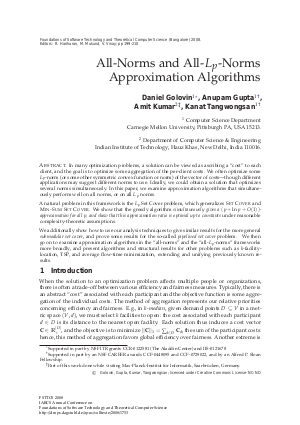All-Norms and All-L_p-Norms Approximation Algorithms
Authors Daniel Golovin, Anupam Gupta, Amit Kumar, Kanat Tangwongsan
-
Part of:
Volume:
IARCS Annual Conference on Foundations of Software Technology and Theoretical Computer Science (FSTTCS 2008)
Part of: Series: Leibniz International Proceedings in Informatics (LIPIcs)
Part of: Conference: IARCS Annual Conference on Foundations of Software Technology and Theoretical Computer Science (FSTTCS) - License:
 Creative Commons Attribution-NonCommercial-NoDerivs 3.0 Unported license
Creative Commons Attribution-NonCommercial-NoDerivs 3.0 Unported license
- Publication Date: 2008-12-05
File

PDF
LIPIcs.FSTTCS.2008.1753.pdf
- Filesize: 454 kB
- 12 pages
Document Identifiers
Subject Classification
Keywords
- Approximation algorithms
- set-cover problems
- combinatorial optimization
- sampling minkowski norms
Metrics
- Access Statistics
-
Total Accesses (updated on a weekly basis)
0Document
0Metadata
Abstract
In many optimization problems, a solution can be viewed as ascribing
a ``cost\'\' to each client, and the goal is to optimize some
aggregation of the per-client costs. We often optimize some
$L_p$-norm (or some other symmetric convex function or norm) of the
vector of costs---though different applications may suggest
different norms to use. Ideally, we could obtain a solution that
optimizes several norms simultaneously.
In this paper, we examine approximation algorithms that
simultaneously perform well on all norms, or on all $L_p$ norms.
A natural problem in this framework is the $L_p$ Set Cover
problem, which generalizes \textsc{Set Cover} and \textsc{Min-Sum Set
Cover}. We show that the greedy algorithm \emph{simultaneously
gives a $(p + \ln p + O(1))$-approximation for all $p$, and show
that this approximation ratio is optimal up to constants} under
reasonable complexity-theoretic assumptions.
We additionally show how to use our analysis techniques
to give similar results for the more general \emph{submodular set
cover}, and prove some results for the so-called \emph{pipelined set
cover} problem.
We then go on to examine approximation algorithms in the
``all-norms\'\' and the ``all-$L_p$-norms\'\' frameworks more broadly,
and present algorithms and structural results for other problems
such as $k$-facility-location, TSP, and average flow-time
minimization, extending and unifying previously
known results.
Cite As Get BibTex
Daniel Golovin, Anupam Gupta, Amit Kumar, and Kanat Tangwongsan. All-Norms and All-L_p-Norms Approximation Algorithms. In IARCS Annual Conference on Foundations of Software Technology and Theoretical Computer Science. Leibniz International Proceedings in Informatics (LIPIcs), Volume 2, pp. 199-210, Schloss Dagstuhl – Leibniz-Zentrum für Informatik (2008)
https://doi.org/10.4230/LIPIcs.FSTTCS.2008.1753
BibTex
@InProceedings{golovin_et_al:LIPIcs.FSTTCS.2008.1753,
author = {Golovin, Daniel and Gupta, Anupam and Kumar, Amit and Tangwongsan, Kanat},
title = {{All-Norms and All-L\underlinep-Norms Approximation Algorithms}},
booktitle = {IARCS Annual Conference on Foundations of Software Technology and Theoretical Computer Science},
pages = {199--210},
series = {Leibniz International Proceedings in Informatics (LIPIcs)},
ISBN = {978-3-939897-08-8},
ISSN = {1868-8969},
year = {2008},
volume = {2},
editor = {Hariharan, Ramesh and Mukund, Madhavan and Vinay, V},
publisher = {Schloss Dagstuhl -- Leibniz-Zentrum f{\"u}r Informatik},
address = {Dagstuhl, Germany},
URL = {https://drops.dagstuhl.de/entities/document/10.4230/LIPIcs.FSTTCS.2008.1753},
URN = {urn:nbn:de:0030-drops-17537},
doi = {10.4230/LIPIcs.FSTTCS.2008.1753},
annote = {Keywords: Approximation algorithms, set-cover problems, combinatorial optimization, sampling minkowski norms}
}
